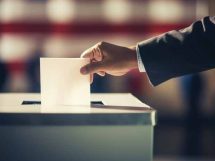
Experts routinely credit Kentucky’s land and water as factors that have made bourbon “America’s Spirit.”
And thanks to an expansive workforce, investors, master distillers and savvy execs, bourbon has developed a cult-like devotion by consumers and collectors.
While it’s often taken for granted, another force for the booming tourism that now centers around bourbon in Kentucky (which has become known as bourbonism) is elected state leadership that has helped chart the way.
These bourbon backers have steadily removed archaic laws dating back decades, modernizing state statutes to match the current era. Roughly 20 changes to Prohibition-era thinking have made a significant difference.
American politics is rife with stories of alcohol on election day, from George Washington’s win to fabled stories from Kentucky’s folklore. To stem the liquid influence, alcohol could not be sold when polls were open.
This Prohibition-era ban was finally removed in 2013 via legislation sponsored by Sen. John Schickel, R-Union. Just a year later, Sen. Schickel backed a successful change for craft bourbon distillers to have a smoother and more affordable start up, bringing more craft bourbon for sale.
This past session, Sen. Stephen West (R-Paris) championed legislation to broaden craft distillers’ sales and brand recognition. A new law allows them to distribute up to 5,000 gallons of spirits each year to retail outlets like restaurants, bars, and bottle shops.
For years, state parks allowed no alcohol sales, which many complained was a barrier to growth. A change to law made this possible, creating a positive for the park system.
The bourbon barrel tax, imposed as barrels aged for years unsold, was revised to allow a tax credit for the amount paid. This initiative was led by Senate President Robert Stivers, R-Manchester, and former Rep. Rick Rand in a bipartisan push.
The barrel tax was addressed again in 2023 in a major bill sponsored by House Speaker David Osborne (R-Prospect) and Rep. Jason Petrie (R-Elkton). The complexity stems from the tax supporting multiple important local functions, even though no other nation taxes aging spirits like we do.
After much effort, the tax will be systematically removed over the next 20 years. Bourbon producers lobbied heavily for the phase out, coming up against strong local official objections.
Expanding the tourism factor
Sen. Schickel stepped in again to answer the frustrations of bourbon tourists. A new law allowed gift shop purchases of bottles, dining in a restaurant, ordering a drink and trying bourbon samples. This change dramatically impacted the extraordinary bourbon tourism increase, making bourbon tours and experiences far more popular.
In 2017, former Rep. Chad McCoy led the move for rare bottles of bourbon to be sold by collectors through licensed retailers, a long-missed opportunity.
On top of this came a breakthrough for shipping bourbon. McCoy, who hails from Bardstown (known as “the bourbon capital of the world”), guided the change in law to address the biggest request of all tourists: Can we ship bourbon home? The answer finally became yes.
Later McCoy also paved the way for tasting rooms at distilleries and the sale of exclusive bottles not sold in stores.
During the COVID-19 pandemic, when hand sanitizers became crucial but scarce, distilleries began making the product for extensive distribution. President Stivers again took the lead to protect producers from liability.
New language in the law paved the way for “alcohol to go” as a part of carry-out orders since restaurants and bars were struggling given the absence of patrons. “To go” alcohol orders remain in place.
Shipping spirits directly to the homes of bourbon lovers out of state had long been a goal for the industry. Former Rep. Adam Koenig sponsored legislation that has since become a national model for direct-to-consumer (DTC) shipping.
Balancing access with safety
Throughout all of the pushes for modernization to alcohol policy has been the call for increased public safety measures. The state passed three separate laws for the use of ignition lock provisions. The systems make sure drivers are sober.
Sponsors for these laws were Sen. Whitney Westerfield (R-Crofton); former Rep. Dennis Keene and the House Majority Floor Leader Steven Rudy (R-Paducah).
In 2024, Rep. Matt Koch (R-Paris) pushed omnibus legislation that expands alcohol education and responsibility awareness measures.
Reform efforts also had the consistent support of House Speaker David Osborne as well as the former speaker, Gregory Stumbo.
Three governors have signed laws once passed by the legislature. Gov. Steve Beshear, Gov. Matt Bevin, and now-Gov. Andy Beshear have inked the changes for the signature industry.
Another strong factor for change is the Kentucky Distillers’ Association, long led by Eric Gregory, plus a team of advocates on behalf of bourbon producers, the tourism industry, workforce and economic development leaders among many others.
Some 60 years ago the Congress voted Kentucky as the birthplace of bourbon and voted bourbon to be the only official native spirit of the nation.
A clear advantage for the home team has been a decade-plus of decisive actions in Frankfort with decision-makers paving the way for the spirits industry’s ascent.





